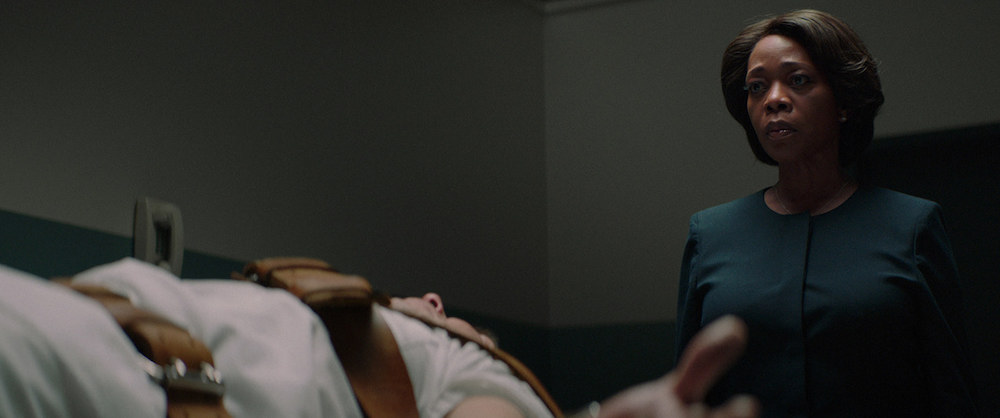We are republishing this piece on the homepage in allegiance with a critical American movement that upholds Black voices. For a growing resource list with information on where you can donate, connect with activists, learn more about the protests, and find anti-racism reading, click here. “Clemency” is now streaming on Hulu, and available for discount rentals on various digital platforms. #BlackLivesMatter.
On September 21, 2011, Troy Davis was executed for the August 19, 1989 murder of police officer Mark MacPhail in Savannah, Georgia. His story generated a national movement of calls for clemency from activist, abolitionist, presidents, and from some of the most unlikely voices—wardens.
“One of the things that really intrigued me and moved me leading up to his execution was that there were a group of retired wardens and directors of corrections who were a part of the hundreds of thousands of people protesting against his execution,” Chinonye Chukwu, director, says of Troy Davis. “Their urging of the governor … was not just on the grounds of possible innocence, but it was also speaking to the emotional and psychological consequences that they knew killing Troy would have on the corrections staff sanctioned to do so.”
And this is what sets “Clemency” apart from the slate of films that premiered at Sundance – Chukwu’s grounded dedication to the real-life study of the emotional and psychological turmoil that consumes those tasked with ending a life. The film isn’t easy to watch—almost immediately we are faced with the agonizing discomfort of a botched execution. Yet, this is why “Clemency” is worth every minute of your attention—its questions of humanity flow from the screen and into our collective consciousness. Who has the authority to take another life?
Alfre Woodard is nothing short of brilliant in her role as Bernadine Williams, a seemingly cold, seasoned warden who approaches the final minutes of men’s lives as mere business exchanges. She brings a deeply felt stillness to her performance managing a contemplative restraint that resonates throughout the film. Even with such a distinguished career under her belt, Woodard’s towering performance is sure to push her into awards contention. “Clemency” is gentle in its placement of race as a thematic foundation instead allowing the focus to remain on the looming threat of execution lingering over the heads of both Bernadine and inmate Anthony Woods. Secondary conflicts of love, family, empathy, compassion, and forgiveness are beautifully sown into the various relationships throughout the film, leaving you feeling as if there are more than just inmates searching for a hint of mercy.

Unsurprisingly there were a number of subtly magnificent performances. While Warden Williams perspective dominates the narrative, Chukwu sowed in several other central perspectives. There is Aldis Hodge as Inmate Woods, whose relative silence is that much more unbearable as his minuscule hope shifts to hurried desperation when he exclaims, “I decide when I die” after a botched suicide attempt. The range of this intense performance adds further shades of empathy to a complex picture, forcing the audience to reckon with questions of literal life and death.
Danielle Brooks is devastatingly brilliant in one scene as Anthony’s estranged partner, Evette. Her appearance clues us into Anthony’s background but also does something that films don’t often allow for Black women—she refuses to carry the emotional load of a man facing a life sentence. While that seems harsh, it is a small but important point in a film already heavily reliant on the emotional labor of its protagonist. Brooks’ character breaks free of the notion that Black women must show love in ways that are detrimental to self in preservation of others.
This is a delicately constructed film, especially in terms of its aural and visual sense. The beautifully agile movements of the camera coupled with its widescreen composition make a statement about the characters. Through the use of additional negative space that the wider frame provides, the framing of certain characters on various edges of the composition accentuates their physical and emotional alienation. With a masterful use of silence between the score, “Clemency” presents viewers with the gut-wrenching question of whether anyone can truly find absolution from or within themselves.
Still the mainstay of this film, for me, isn’t the overwhelmingly true-to-life story or the emotionally gripping performances, but the ways that Chukwu took to heart the real-life stories of wardens and inmates that she interviewed for the film. Too often portrayals of prisons fall flat with overwrought dialogue and overextended plots. Chukwu offers humanity to those existing within the system at every level. And in many ways, you can feel the individual stories of inmates being brought to life through Anthony’s hopeless reality of certain death. Chukwu’s dedication to her cause-driven narrative, with such an intimate expression, strongly defines the filmmaker’s work.
“Clemency” is now streaming on Hulu, and available for discount rentals on various digital platforms.











